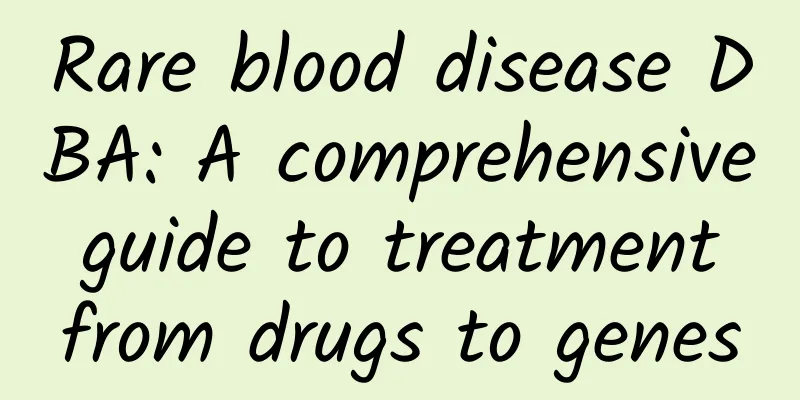Why does menstruation only last two days?

|
Menstruation is a sign of ovarian maturity. It occurs every month after menarche and is a regular sign of female development. Women's menstruation usually lasts 2 to 8 days. As long as it is regular within this range, it is normal, so don't worry too much about yourself. This article introduces relevant content about women's menstruation. If you need it, please take a look. Menstruation refers to regular, periodic uterine bleeding, also known as menstrual period, monthly fluid, monthly period, and menstrual leave. Strictly speaking, this bleeding should be accompanied by ovarian follicle maturation, ovulation and corpus luteum formation, and the endometrium should undergo changes from proliferation to secretion. Menstruation should have normal cycles, periods, volume, color and quality. Normal menstruation is cyclical. The first day of bleeding is the beginning of the menstrual cycle, and the interval between the first days of two menstrual periods is called a menstrual cycle. The menstrual cycle is generally 21-35 days, with an average of 28 days. The duration of each menstrual period for women is called menstruation, which is generally 2-8 days, with an average of 4-6 days. The length of the cycle varies from person to person. Occasionally, a period that is advanced or delayed by no more than 7 days can still be considered normal. That is, the menstrual cycle should not be less than 21 days and not more than 35 days. Menstruation stops during pregnancy and lactation. Menstrual volume refers to the total amount of blood lost during one menstruation. Normal blood volume is 20-60ml. Menstrual volume exceeding 80ml is considered menorrhagia. Menstruation is a physiological phenomenon. There are generally no special symptoms during the menstrual period. Some women may experience discomfort in the lower abdomen and lumbar sacral area, and a few women may have headaches and mild symptoms of nervous system instability. The menstrual cycle varies from woman to woman. In fact, every woman has her own menstrual cycle, some last as little as 20 days, and some as long as 36 days. As long as it is within this time range, it is normal. According to clinical investigation and statistics from relevant departments, only about 10% of women can actually have their menstruation every 28 to 30 days. As long as the intervals between periods are the same, it is normal. Irregular advances or delays are abnormal and may be symptoms of a certain disease, which requires accurate recording of the time of each time, otherwise it will be difficult to infer based on impression alone. What are the causes of short menstrual cycles? The normal menstrual cycle of women is generally 28-30 days. The length of the cycle varies from person to person, but a menstrual cycle shorter than 21 days should be considered an abnormal short menstrual cycle. The main reasons for short menstrual cycles in adult women are as follows: 1. Age. There are many factors that lead to short menstrual cycles, and age is a major factor. The reasons for short menstrual cycles in women of different ages can also vary greatly. Generally speaking, the menstrual cycle becomes shorter during puberty and menopause. 2. Poor ovarian reserve function. After the age of 35, a woman's ovarian reserve capacity decreases. Menstruation is regulated by the interaction between three hormones: the hypothalamus, pituitary gland and ovaries. When the ovarian reserve function decreases, menstruation tends to come more frequently. 3. Luteal insufficiency. Menstruation is caused by atrophy of the corpus luteum, which leads to a decrease in the secretion of estrogen and progesterone. The endometrium lacks support from sex hormones, resulting in necrosis and shedding. Therefore, if the corpus luteum is incomplete, the entire luteal phase will be relatively shortened, and menstruation will naturally come more frequently. 4. Bleeding during ovulation. Although ovulation bleeding looks like menstruation, it is actually ovulation bleeding. It is not menstruation caused by the shedding of the endometrium, but may also be caused by the discharge of an egg. Some people may mistake ovulation bleeding for menstruation, and therefore think that their menstrual cycle is short. |
<<: No menstruation for 2 months after miscarriage
>>: How to distinguish menstruation after childbirth
Recommend
What to do if the areola is broken
If the areola is broken, female friends must pay ...
What can you do after being infected with AIDS: Early diagnosis and early treatment, the life expectancy of infected people is not much different from that of normal people?
1 Clinically, HIV infection is divided into three...
Can I eat pears during menstruation?
We all know that the snow pear is a cool fruit, w...
There is a lump in the breast and it hurts, what's going on?
The breast is a very important part of the female...
Is it normal for a 14-year-old girl not to have her period?
The most obvious sign of the beginning of a girl&...
What is the cause of itchy small bumps on the vulva?
In fact, the appearance of some small bumps on th...
What causes pain in the left lower abdomen after childbirth?
Giving birth is something that every woman must e...
Small granules on the inner side of the vagina are very itchy
Under normal circumstances, small particles will ...
What is the effect of drinking motherwort after miscarriage?
In modern society, miscarriage is a very common p...
30-year-old women should avoid these misunderstandings when dressing in autumn
Although 30 years old may be a major milestone in...
Will breasts swell and hurt during implantation?
Everyone knows that when a woman becomes pregnant...
When is the best time to go to Mauritius? How is Mauritius tourism?
Mauritius is known as the paradise on earth in Af...
Medicine to prevent uterine contractions
Because some women will experience false labor du...
Best time for hernia surgery in girls
Hernia is a problem that children are more likely...









